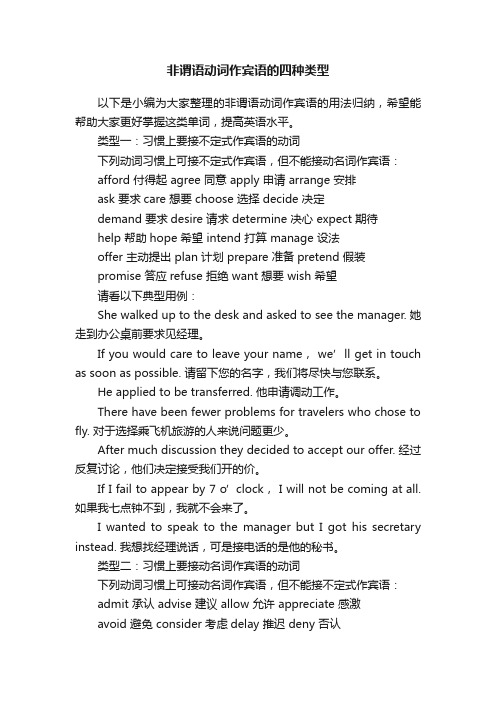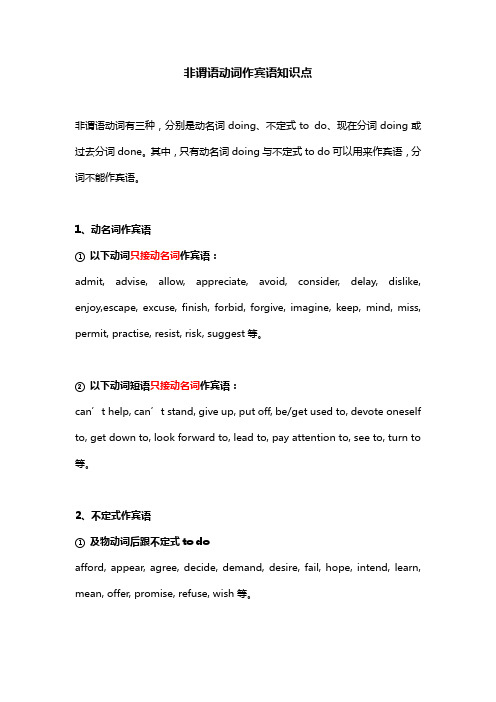非谓语动词作宾语
非谓语动词作宾语的情况

非谓语动词作宾语的情况语言中的动词一般可以分为谓语动词和非谓语动词,但他们之间又有着许多细微的关系,其中,非谓语动词作宾语的情况也是一个值得深究的问题。
本文将针对此情况,从语法角度对其进行探讨。
一、非谓语动词作宾语的情况在英语中,非谓语动词作宾语的情况不算罕见,一般都是指用动词不定式、动名词或者动词-ing形式作宾语的情况。
比如,they enjoy listening to music(他们喜欢听音乐), I will never forget seeing the Grand Canyon(我永远都不会忘记看到大峡谷的情景)等。
二、宾语动词的意义非谓语动词作宾语的情况,主要就是指将动词不定式、动名词或者动词-ing形式用作宾语,而这种情况的出现,其实也附带着某种意义之下。
1、当动词用不定式作宾语时,通常会暗示着某种行为或者动作发生或者独立存在,比如,I saw him walking home(我看见他步行回家)里的walking home就是一个动词不定式,它暗示的是别人在作某种行动,也就是步行回家的行为。
2、当动名词作宾语的时候,通常会暗示着一种习惯性或者长期性的行为存在,比如,I like playing basketball(我喜欢打篮球)里的playing basketball就是一个动名词,它暗示的是别人有习惯性的行为,也就是经常打篮球。
3、当动词-ing形式作宾语的时候,通常会暗示着某种正在进行或者正在发生的行为,比如,I hate hearing people argue(我讨厌听人争吵)里的hearing people argue就是一个动词-ing形式,它暗示的是别人正在发生的行为,也就是人们正在争吵的行为。
三、用法实例1、当动词用不定式作宾语的时候,通常会和其他词一起使用,比如:(1)She loves to dance(她喜欢跳舞)(2)He enjoys studying in the library(他喜欢在图书馆里学习)(3)I hate to argue with people(我讨厌和人争吵)2、当动词用动名词作宾语的时候,也会和其他词一起使用,比如:(1)She likes reading books(她喜欢读书)(2)He enjoys playing basketball(他喜欢打篮球)(3)I can stand listening to people argue(我受不了听人争吵)3、当动词用动词-ing形式作宾语的时候,也会和其他词一起使用,比如:(1)She doesn mind hearing people talking(她不介意听别人说话)(2)He hates watching people fight(他讨厌看到别人打架)(3)I can stand seeing people argue(我受不了看到人们争吵)四、结论从以上讨论可以看出,非谓语动词作宾语的情况并不罕见,而且它还会伴随着某种特定的意义,比如某种行为发生、习惯性的行为存在以及正在发生的行为等。
非谓语动词作宾语的四种类型

非谓语动词作宾语的四种类型以下是小编为大家整理的非谓语动词作宾语的用法归纳,希望能帮助大家更好掌握这类单词,提高英语水平。
类型一:习惯上要接不定式作宾语的动词下列动词习惯上可接不定式作宾语,但不能接动名词作宾语:afford 付得起 agree 同意 apply 申请 arrange 安排ask 要求care 想要 choose 选择 decide 决定demand 要求desire 请求 determine 决心 expect 期待help 帮助hope 希望 intend 打算 manage 设法offer 主动提出 plan 计划 prepare 准备pretend 假装promise 答应refuse 拒绝 want 想要 wish 希望请看以下典型用例:She walked up to the desk and asked to see the manager. 她走到办公桌前要求见经理。
If you would care to leave your name,we’ll get in touch as soon as possible. 请留下您的名字,我们将尽快与您联系。
He applied to be transferred. 他申请调动工作。
There have been fewer problems for travelers who chose to fly. 对于选择乘飞机旅游的人来说问题更少。
After much discussion they decided to accept our offer. 经过反复讨论,他们决定接受我们开的价。
If I fail to appear by 7 o’clock, I will not be coming at all. 如果我七点钟不到,我就不会来了。
I wanted to speak to the manager but I got his secretary instead. 我想找经理说话,可是接电话的是他的秘书。
非谓语动词作宾语

小议非谓语动词作宾语英语中"不定式、动名词、分词"统称为非谓语动词。
能作动词宾语的有动名词和不定式。
英语中并非所有的动词后都能跟非谓语动词作宾语,而有动词既能跟不定式作宾语,又能跟动名词作宾语。
一、能跟动名词作宾语的动词:suggest、imagine、mind、practise、allow、advise 、risk、keep、keep on、avoid、escape、enjoy、hate、consider(考虑)、excuse、finish、miss、insist on、look forward to、reel like、intend、continue、remember、forget、regret、go on、top、stant /begin、try等。
二、其中like、intend、continue这三个动词后即可跟动名词宾语、又可跟不式宾语、并且二者没有区别或者说区别不大。
Does he intend to buy a new house? Does he intend buying a new house?三、其中:remember、forget、regret、stop、go on、need、start/begin、try即可用动名词作宾语、又可跟不定式作宾语,二者区别为下:remember: remember doing sth.记着干过某事remember to do sth.记住去干某事forget: forget to do sth.忘了去干某事forget doing sth.忘了干过某事regret: regret to do sth.遗憾地去干某事regret doing sth.后悔已干过某事stop: stop to do sth.停下来去干另一件事stop doing sth.停止正在干的事need: need的主语是"物"时,用动名词作宾语,且用主动式表示被动。
非谓语动词作宾语

“动词+疑问代(副)词+不定式”结构:常见的这类动词有advise, decide,forget,know,learn,remember,see,tell,think,teach, wonder,discover,understand,guess,explain等。这类疑问代(副)词有 what,when,which,where,how,whether等(不包含why)。如:
?with宾语doing宾语与宾补之间是逻辑上的主谓关系?with宾语done宾语与宾补之间是逻辑上的动宾关系?with宾语todo表将来专业文档?连词分词结构只有两种形式
第二部分
语法专项突破
非谓语动词
考点四 非谓语动词作宾语、表语和主语
1.非谓语动词作宾语 (1)在三种非谓语动词中只有动名词和动词不定式可以用来作宾语,分词 不能作宾语。 (2)动名词作宾语: 以下动词只接动名词作宾语,不能接不定式:admit,advise,allow, appreciate,avoid,consider,delay,dislike,enjoy,escape,excuse, finish,forbid,forgive,imagine,keep, mind,miss,permit,practise, resist,risk,suggest等。
(3)动词不定式作宾语:
不定式作宾语有两种情况,一是及物动词后直接跟带to的不定式,二是 “动词+疑问词+带to的不定式”。
“动词+带to的不定式”结构:常见的接不定式作宾语的动词有afford, appear,agree,decide,demand,desire,fail,hope,intend,learn, mean,offer,promise,refuse,wish等。
非谓语动词作宾语讲解

非谓语动词作宾语讲解非谓语动词是指在句子中充当宾语的动词的非谓语形式,包括动词不定式、动名词和分词。
非谓语动词作宾语常见于复合句中,可以起到丰富句子结构、增强语义、简化句子等作用。
本文将详细讲解非谓语动词作宾语的用法和注意事项。
一、动词不定式作宾语动词不定式作宾语时,常用形式为“动词不定式+to”,其中to可以省略。
一般来说,动词不定式作宾语时,在意义上相当于一个名词,可以表示目的、结果、愿望、能力等。
例句:1. I want to learn how to play the guitar.(我想学会弹吉他)2. She decided not to go abroad for further study.(她决定不出国深造)除了直接作宾语外,动词不定式还可以作及物动词的宾语补足语,说明宾语具备的特点、状态或能力。
例句:1. They find it difficult to solve the math problem.(他们发现解这个数学问题很困难)2. I consider him to be a reliable friend.(我认为他是一个可靠的朋友)二、动名词作宾语动名词作宾语时,常形式为“动名词+ing”。
动名词作宾语可以表示动作或状态,常用于感官动词(see, hear, feel等)和使役动词(make, let, have等)后面。
例句:1. I enjoy swimming in the sea.(我喜欢在海里游泳)2. My mother made me clean my room.(我妈妈让我打扫房间)动名词作宾语还可以表示习惯、爱好等。
例句:1. She gave up smoking last year.(她去年戒烟了)2. He hates doing housework.(他讨厌做家务)三、分词作宾语分词作宾语时,常用现在分词或过去分词形式。
分词作宾语可以表示被动、完成或正在进行等含义。
非谓语动词作宾语知识点

非谓语动词作宾语知识点非谓语动词有三种,分别是动名词doing、不定式to do、现在分词doing或过去分词done。
其中,只有动名词doing与不定式to do可以用来作宾语,分词不能作宾语。
1、动名词作宾语①以下动词只接动名词作宾语:admit, advise, allow, appreciate, avoid, consider, delay, dislike, enjoy,escape, excuse, finish, forbid, forgive, imagine, keep, mind, miss, permit, practise, resist, risk, suggest等。
②以下动词短语只接动名词作宾语:can’t help, can’t stand, give up, put off, be/get used to, devote oneself to, get down to, look forward to, lead to, pay attention to, see to, turn to 等。
2、不定式作宾语①及物动词后跟不定式to doafford, appear, agree, decide, demand, desire, fail, hope, intend, learn, mean, offer, promise, refuse, wish等。
②动词+疑问代(副)词+不定式to do动词:advise, decide, forget, know, learn, remember, see, tell, think, teach, wonder, discover, understand, guess, explain等。
疑问词:what, when, which, where, how,whether。
e.g. He will tell you how to deal with it.特别说明:不定式作宾语时,有时会使用it作形式宾语,然后把不定式放后面。
非谓语动词作宾语
忘记要做某事 忘记曾经做过某事
stop to do stop doing
停下来去做某事 停止做某事
go on to do go on doing
继续做另一件事 继续做原来在做的事
• regret to do • regret doing sth • try to do sth • try doing sth • mean to sth • mean doing sth
否定形式 not to do
被动形式 to be done
进行形式
to be doing
进行式表示的动作或状态,与谓语动词表 示的动作或状态同时发生
完成形式 to have done
完成式表示动作或状态,发生在谓语动 词表示的动作或状态之前
• He is said to translate the book into English
• 3. We make it our duty to study hard at school.
• 4. I have made it clear to them not to play games this afternoon.
5).介词之后的宾语 • Look forward to ,devote oneself
Eg : I remember seeing you somewhere before.
我记得以前在哪儿见过你。
Please remember to turn off the light when you leave.
离开时请记得关好灯。
4) :如果作宾语的不定式结构后面还有自己的补语,则 应使用先行 it,把不定式后置
It's no good eating too much fat. It's no good for you to eat so much fat.
非谓语动词作宾语的情况
非谓语动词作宾语的情况1、先行词有多种不同的时态和人称如:现在、过去、将来。
这些先行词本身就含有“将”“给……”“被”“受到”等状态,所以后面的动词只能用动名词。
如: The village is surrounded by mountains。
被山包围的村庄。
2、先行词与宾语之间有不合逻辑或不搭配的情况。
如: The meeting was full of lively discussion。
这次会议充满了热烈的讨论。
“ lively”本身不含有形容词,也没有形容词的比较级和最高级,所以不可以与比较级和最高级并列使用。
3、宾语是主动语态中的非谓语动词。
如: It doesn’ t matter what happens to the apple。
无论怎样,对苹果都不重要。
“怎样”在这里表示一种假设,而不是一个实际的动作。
非谓语动词作宾语也可用于复合宾语。
如:4、宾语是带疑问性的动词,它有两种可能的情况:一种是疑问代词;另一种是疑问副词。
这两种成分的句子往往是有特定语义指向的,前者如: Who can we find?谁可以找到呢?(可数) Someone is missing。
某人失踪了。
(可数) One-eyed student is happy。
单眼皮学生很高兴。
(不可数) Someone has been away。
某人离开了。
(不可数) Someone is walking into the classroom。
有人走进教室。
(不可数) Someone is walking out the door。
有人走出了大门。
(不可数) There is something wrong with his room。
他房间里有点儿东西不对劲。
(不可数) Someone is cleaning thewindows。
有人在擦玻璃。
(不可数) Someone is eating something。
有人在吃东西。
非谓语做宾语
非谓语动词语做宾语的概述一、非谓语动词语做宾语的概念非谓语动词语是指不作谓语的动词形式,包括不定式、动名词和分词。
非谓语动词语具有动词的特征,可以表示动作、状态、过程等,也可以带有自己的宾语、状语等,但是不受主语的人称和数的限制,也不表示时态和语态。
非谓语动词语可以作为句子的主语、宾语、定语、状语等成分,其中作为宾语的非谓语动词语是本文的重点。
非谓语动词语做宾语时,要注意与主语或谓语动词的搭配关系,以及不同形式的含义和语气的区别。
一般来说,有些动词只能接动名词或名词作宾语,有些动词只能接不定式作宾语,有些动词既可以接动名词也可以接不定式作宾语,但意义或语气有所不同,还有些动词可以接动名词或不定式作宾语,意义或语气没有明显差别。
因此,学习非谓语动词语做宾语时,要根据具体的动词和语境,选择合适的形式。
二、非谓语动词语做宾语的分类根据非谓语动词语的形式,可以将其分为三类:不定式、动名词和分词。
下面分别介绍这三类非谓语动词语做宾语的用法和特点。
1. 不定式做宾语不定式是由to加上动词原形构成的非谓语动词语,可以表示目的、意愿、可能等。
不定式做宾语时,可以直接跟在动词后面,也可以用it作为形式宾语,将不定式放在句末。
不定式做宾语时,可以有以下几种形态:一般式,表示一般性或同时发生的动作,如:I want to see you.完成式,表示在谓语动词之前已经完成的动作,如:He pretended to have seen the film.进行式,表示正在进行的动作,如:She pretended to be sleeping.被动式,表示被动的动作,如:He is glad to be invited to the party.不定式做宾语时,要注意以下几点:有些动词后只能接不定式作宾语,不能接动名词或名词,如:agree, decide, expect, hope, manage, offer, plan, promise, refuse, tend, want, wish等,如:He agreed to help me.有些动词后可以接不定式或动名词作宾语,但意义或语气有所不同,如:forget, remember, regret, stop, try, need等,如:I forgot to lock the door.(我忘了锁门。
英语语法非谓语动词 做宾语及宾语 的口诀
英语语法非谓语动词做宾语及宾语的口诀在学习英语语法的过程中,我们经常会遇到非谓语动词作为宾语或宾语补足语的情况。
非谓语动词是指动词的非真实形式,如不定式、动名词和现在分词等。
在这篇文章中,我们将探讨非谓语动词作为宾语及宾语补足语的使用方法,并给出一些简单的口诀帮助你记忆。
非谓语动词作宾语非谓语动词可以作为动词的宾语,通常用于表示动作或状态的延续。
下面是一些常见的非谓语动词作为宾语的情况:1. 不定式作宾语:- 主语 + 动词 + 不定式(to + 动词原形)例如:She wants to learn English.(她想学英语。
)2. 动名词作宾语:- 主语 + 喜欢/继续/开始 + 动名词(动词 + ing)例如:He enjoys swimming.(他喜欢游泳。
)3. 现在分词作宾语:- 主语 + 动词 + 现在分词(动词 + ing)例如:I heard him singing.(我听到他在唱歌。
)我们可以用一个简单的口诀来记忆非谓语动词作为宾语的形式:To 喜 ing,喜 ing,听 ing。
非谓语动词作宾语补足语除了作为宾语,非谓语动词还可以作为宾语补足语,用来补充或说明宾语的内容。
下面是一些常见的非谓语动词作为宾语补足语的情况:1. 不定式作宾语补足语:- 主语 + 动词 + 宾语 + 不定式(to + 动词原形)例如:She made him promise to come back.(她让他答应回来。
)2. 动名词作宾语补足语:- 主语 + 动词 + 宾语 + 动名词(动词 + ing)例如:I find swimming relaxing.(我发现游泳很放松。
)3. 现在分词作宾语补足语:- 主语 + 动词 + 宾语 + 现在分词(动词 + ing)例如:We saw him walking in the park.(我们看到他在公园里散步。
)我们可以用一个简单的口诀来记忆非谓语动词作为宾语补足语的形式:要爱喜 ing,喜 ing,看 ing。
- 1、下载文档前请自行甄别文档内容的完整性,平台不提供额外的编辑、内容补充、找答案等附加服务。
- 2、"仅部分预览"的文档,不可在线预览部分如存在完整性等问题,可反馈申请退款(可完整预览的文档不适用该条件!)。
- 3、如文档侵犯您的权益,请联系客服反馈,我们会尽快为您处理(人工客服工作时间:9:00-18:30)。
Eg : I remember seeing you somewhere before.
我记得以前在哪儿见过你。
Please remember to turn off the light when you leave.
离开时请记得关好灯。
4) :如果作宾语的不定式结构后面还有自己的补语,则 应使用先行 it,把不定式后置
一、先结构。
•非谓语动词充当动词的宾语时候, 它的形式要由前面的动词决定。 因此,我们要先考虑它与前面动 词固定搭配的结构形式。有些动 词的宾语只接动词不定式;而有 些动词或动词短语则要求只能用 动名词(-ing)作宾语。
三、后时态。
• 前面两种情况都考虑完后,我们要根据语 境分辨非谓语动词这个动作或状态与对应 的谓语动词两个动作发生的顺序选择正确 的时态。如果非谓语动词这个动作或状态 在对应的谓语动词之前所发生的,则要用 完成式to have done(主动)或to have been done(被动);同时发生的, to be doing(被动);之后发生的,可 用不定式to do(主动)或to be done (被动)。
(1) It is/was +adj.+of sb. to do… (2) It is +adj.+for sb.+to do…
(3) it is +a +名词+ to do
• 不定式做主语一般表示具体,将来的,某次 的动作。
不定式作主语经常表示具体动作,常与特定 的动作执行者联系在一起;而动名词作主语 经常表示抽象动作,经常不与特定的动作执 行者联系在一起。
• 1.We find it easy to reach the moon come back, but we find it troublesome to cross our own street and meet our neighbors .
• 2. The teachers makes it a rule for us to speak English in the classroom.
定义
动词不定式是非谓语动词的一种,它没有人称和 数的变化,在句子中不能独立作谓语,但它仍保 持动词的特点,既可以有自己的宾语和状语。
用法
动词不定式具有名词、形容词和副词的 特征。因此在句中可以做主语、表语、 宾语、宾语补足语、定语和状语。
基本形式
一般形式
to do
一般式表示的动作或状态,发生在谓语 动词表示的动作或状态的同时或之后
[误] The plant needs be watered. [正] The plant needs watering. [析]need to be done=need doing,
动名词主动形式表被动。
二、再语态。
• 不必考虑或考虑完毕非谓语动 词的固定结构后,再分析非谓 语动词与它的逻辑主语的关系, 如果是被动关系,则要选用相 应的被动形式,如to be done, being done, done 等。
这种不定式结构接近一个名词从句
动词+疑问词+不定式
Eg : I’m worrying about what to do next. Marx gave some advice on how to learn a foreign language.
•这类动词常见的有: tell advise show
He didn’t learn nothing at school except to play computer games.
注意不定式符号的省略问题!
do nothing but / except 后的不定式不带to. 需要注意的是,此句型中but/ except 前必须要有实义动词 do时,but / except后的不定式to才能省略,否则to则不省 我们用一句话概括就是: 有do无to,有 to无 do.
to ,be used to, object to, pay attention to, adapt oneself to ,abandon oneself to, be addicted to ,be equal to doing
have trouble in doing sth
Have a good time in doing sth
• 2. I would love to ______the party last night but I had to work extra hours to finish a report .
• A. to go B. to have gone
• C. going D . Having gone
忘记要做某事 忘记曾经做过某事
stop to do stop doing
停下来去做某事 停止做某事
go on to do go on doing
继续做另一件事 继续做原来在做的事
• regret to do • regret doing sth • try to do sth • try doing sth • mean to sth • mean doing sth
• 1.I don’t see how I could possible manage _________ the work without ———。
• A. finish ;helping B , to finish; being help C. finishing; helping
• D finishing ; being helped
• 3. Our professor has just come back from aboard . He seems____ his trip very much.
• A. enjoy B. to have enjoyed
注:不定式结构一般不可作介词宾语, 只有在个别场合, 即在含有否定意义的带 有介词 except 或 but (=except) 的结构中 才能这样用.
Eg : He seldom comes except to look at my pictures.
He didn’t do anything except play computer games.
teach
find out decide discuss
learn
forget inquire
know
explain
remember see
wonder 等。
疑问词(也称连接代/副词)有:what
understand where
who(m) when how
whether
Eg : I don’t know what to do / where to go / who(m) to ask / when to stop / how to get there.
常用动词有: decide / determine, choose , learn, want/would like/ care , expect / hope / wish, plan ,manage, fail, help , offer , promise ,refuse ,arrange, agree, ask / beg /demand, pretend
The squirrels was lucky that it just missed being caught.
3) 有些动词既可跟不定式作宾语,也可跟动名词作宾
语,但含义不同
remember to do remember doing
记住要做某事; 记得曾经做过某事
forget to do forget doing
• 3. We make it our duty to study hard at school.
• 4. I have made it clear to them not to play games this afternoon.
5).介词之后的宾语 • Look forward to ,devote oneself
决心学会想希望,计划设法不能帮。 pe to get there before dark. Never offer to teach fish to swim.
注: 不定式也常用在系动词 seem, appear, 等后作宾语 • He seemed __B_____ by his father since
eg : We thought it wrong not to help her. They found it impossible to get everything ready in time.
find /think/consider/find/feel/make it +adj /noun + to do
I haven’t decided whether to sell it or not.
We must find out what to do next / where to put it.
7.在be worth, deserve, want, need, require后 用动名词的主动形式表示被动含义。
Never offer to teach fish to swim.
I find it really difficult to intend to forget you.
主宾 定 表补 状 语 语 语 语 语语 不定 式
分 词 动 名词
动词 4 不定式
介词 1
动词 1
动名词
介词 1
1.动词不定式作宾语 1)、“动词 + 带 to 的不定式结构”
Eg : She has no choice but to wait for the news.
